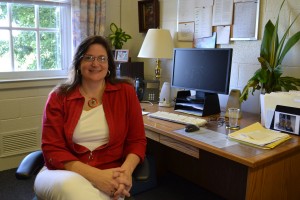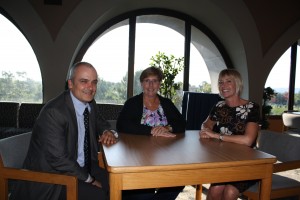Paige Bailey
Contributing Writer
Peace activist and photographer John Noltner challenged University students to “set aside academic life” and judgments of others to consider social justice issues in a talk on Sept. 7. He came to discuss his most recent exhibit, “A Peace of My Mind,” now on display in the library, along with a book of the same title. This lecture was just the first in a series of peace related events to be held on campus this fall.
The “A Peace of My Mind” exhibit is sponsored by Friends of the Library, C.A.R.E., the Griot Institute for Africana Studies, the Social Justice Residential College and the University Lectureship Committee. Rocky’s Revival, a trio of musicians including Associate Professor of Psychology Bill Flack, helped to give the event a warm atmosphere that prompted contemplation.
As a freelance photographer, Noltner’s clients have included national magazines such as Forbes and National Geographic. He has worked for Fortune 500 companies and non-profit groups. Due to the economic decline, Noltner’s business slowed. Instead of becoming discouraged by the recession, he looked for a way to “feed his soul” through his work, and so the “A Peace of My Mind” project was started.
The exhibit and book feature stories from a vast array of individuals Noltner spoke with. The central question of his interviews was: “What does peace mean to you?”
Resident Fellow of the Social Justice College Amari Suskin-Sperry ’15 believes peace “can never quite be defined,” yet at the root of peace is “compromise, unity, tranquility and happiness.”
While Noltner said he is not a peace expert, he hopes to “foster a dialogue” about peace through this project. His work was influenced by his admiration for iconic peace activists such as the Dalai Lama, Mother Theresa and Nelson Mandela. His approach integrates social justice philosophies of these figures with his own artistic aims.
Noltner admitted that when he started the project, the outcome was uncertain. What he did know was that “universal truths” could be found in talking to individuals about the meaning of peace. This message is applicable to students, who attempt to navigate through questions of the future and remain uncertain of how events will materialize.
Noltner began by talking to people near his home in Minnesota. During the interview, he took a black and white portrait of the subject. He approached the interview in a relaxed manner in order to explore what each individual saw as meaningful in terms of peace.
The people he spoke with were a diverse group of 52 people. Noltner spoke with a former governor, a Buddhist teacher, an oil executive and a couple who survived the Holocaust. Through looking at the exhibit, he hopes people can “learn lessons through art and human connection.”
The human connection invoked through art was present at this event, as members of the audience read excerpts from “A Peace of my Mind.” As they read, Rocky’s Revival played The Beatles’ song, “Imagine.” Noltner believes that in “quiet moments,” people can undergo a transformative process. Because of this, there was a pause for personal reflection after the quotes were read.
The “Peace of My Mind” exhibit is linked to the philosophies that underpin the Social Justice College on campus.
“SoJo also encourages students to investigate the ways an individual can effect social change. Noltner’s work is an excellent example of how, in taking relatively small manageable steps, an individual can engage many people in a project that has a substantial positive impact,” said David Kristjanson-Gural, Senior Fellow of the Social Justice College.
While the meanings of peace varied between the individuals in the exhibit, Noltner said there was a prevalent common theme of “working for a common good.” Because of this, people “can always choose pursuing peace.” Through everyday actions, he encouraged the University community to strive for peace and to “embrace” that “we can always make the world a better place.”






